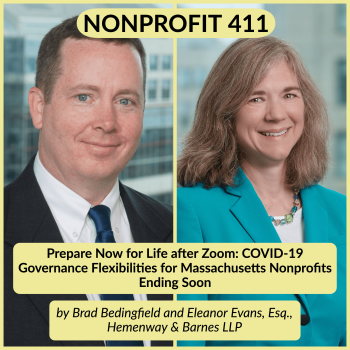 By Brad Bedingfield and Eleanor Evans of Hemenway & Barnes LLP
By Brad Bedingfield and Eleanor Evans of Hemenway & Barnes LLP
Governor Charlie Baker has announced that his March 10, 2020 COVID-19 State of Emergency will end on June 15, 2021. Governance flexibilities afforded Massachusetts nonprofit corporations by temporary emergency legislation enacted last spring – including the authority to hold member meetings via Zoom – will therefore expire August 14, 2021.
As discussed in MNN Nonprofit 411: Emergency Law Provides Governance Flexibility for Massachusetts Nonprofits, the emergency legislation, Section 16 of Chapter 53 of the Acts of 2020 (“Section 16”), provides that, during the current COVID-19 state of emergency and for 60 days thereafter, the board of a nonprofit incorporated in Massachusetts may take certain actions regardless of what its bylaws may say, as long as the nonprofit’s articles of organization do not expressly forbid those actions.
Among other things, Section 16 temporarily permits the board of a Massachusetts nonprofit corporation to allow the corporation’s members to meet remotely by audio- or videoconference. As a result, for the last year, many Massachusetts nonprofits have been holding their member meetings via Zoom or similar videoconference technology. Section 16 also permits members to vote by proxy even if the organization’s bylaws require them to vote in person. (In this context, the term “member” refers only to members with voting rights under Massachusetts nonprofit corporate law, and not to contributors or supporters of the nonprofit that the nonprofit calls “members” but who do not have legal voting rights.)
Review Your Bylaws and Make Changes Now
After August 14, these and other governance flexibilities permitted under Section 16 will no longer be effective and the “regular” provisions of Massachusetts nonprofit corporate law will apply. Under those provisions, members must vote either in person or by proxy. Many Massachusetts nonprofits’ bylaws preclude proxy voting for members, however, meaning that their members must meet in person. Now is a good time to review your organization’s bylaws and, if they include such a provision, to consider removing it to provide members with a means of making decisions at a distance after Section 16 expires.
Boards of Directors May Continue to Meet Remotely
Under the regular provisions of Massachusetts nonprofit corporate law, boards of directors (but not members) of Massachusetts nonprofit corporations may meet via audio- or videoconference where everyone participating in the meeting can hear one another, as long as neither the articles of organization nor the bylaws specify otherwise.
Unanimous Written Consent Needed for Voting by Email
Under Massachusetts nonprofit corporate law, voting by email is not permitted for nonprofit members or directors unless the vote meets the requirements of a unanimous written consent. Members and directors may take an action without a meeting if all members or directors, as applicable, entitled to vote on the matter consent to the action in writing and the written consents are filed with the organization’s meeting minutes.
It is possible to circulate a vote via email to all members or directors, as the case may be, for them to consent to in writing. However, for the vote to be valid, all members or directors, as applicable, entitled to vote on the matter must return the consent. The action becomes effective on the date the last consent is returned. For nonprofits with a large number of voting members, voting by unanimous written consent may not be a practical option.
For Additional Information
If you have questions about how the expiration of the emergency legislation will affect your nonprofit’s governance procedures, please contact Eleanor Evans or Brad Bedingfield at Hemenway & Barnes LLP.
This advisory is provided solely for information purposes and should not be construed as legal advice with respect to any particular situation.
